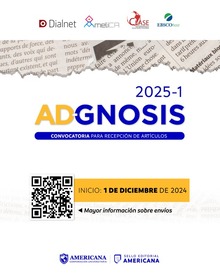Disputa del método en Economía: monismo vs. pluralismo
DOI:
https://doi.org/10.21803/adgnosis.13.14.711Palabras clave:
Disputa del método (methodenstreit), economía austriaca, síntesis neoclásica, economía del conocimiento , la complejidadResumen
Introducción: Revisión crítica de Economía Política sobre la disputa del método en Economía y la reactualización de su debate para revisar el estado del conocimiento económico y afrontar así, sus retos en curso. Dicha disputa parte de la anterior, relativa a la renuncia teórica y el exceso instrumental y aplicado de la Economía con la Síntesis Neoclásica, alejándose con sus modelizaciones de la realidad y sus cambios, además de generar un malestar estudiantil. Objetivo: Sintetizar el desarrollo de las disputas del método según la Escuela Austriaca, para sacar a la Economía del ámbito de las Ciencias Naturales e Ingenierías, y sus reducciones a modelos de equilibrio y excesos matemáticos. Metodología: se recurre a los marcos teóricos y metodológicos de la Escuela Austriaca, compartidos con otros enfoques heterodoxos de fundamentos (Neoinstitucionalistas), para contrastarlos con los préstamos de Ciencias Naturales e Ingenierías y asumidos por la Síntesis Neoclásica, con la pretensión más predictora que realista. Resultados: se sistematizan los principales problemas del conocimiento económico y cómo corregirlos (científica y docentemente) para transitar a la Economía del conocimiento y la complejidad. Conclusiones: la actual disputa del método no sólo permite recuperar los fundamentos de la Economía (vía giro hermenéutico y revolución copernicana en la ciencia y en su docencia), sino también su reconexión con las Ciencias Sociales y la cambiante realidad social. Se favorece también el tránsito a la Economía del conocimiento y la complejidad, y se evidencia la secular polémica de desarrollistas vs. decrecentistas.
Descargas
Referencias
Achinstein, P. (2004). General Introduction. Science Rules: A Historical Introduction to Scientific Methods. Baltimore: Johns Hopkins University Press.
Alcorn, S., Solarz, B. (2006). The autistic economist. Post-Autistic Economics Review, 38: 13-19.
Anderson P., Arrow K., Pines D. (1988). The Economy as an Evolving Complex System, Santa Fe: Santa Fe Institute Studies in the Sciences of Complexity (reditado por Longman).
Arthur, B., Beinhocker, E., Stanger, A. (2020).Complexity Economics. Santa Fe: Santa Fe Institute Press.
Balland, P.A., Broekel, T., Diodato, D., Giuliani, E., Hausmann, R., O'Clery, N., Rigby, D. (2022) The new paradigm of economic complexity. Research Policy, 51(3): 104450 https://doi.org/10.1016/j.respol.2021.104450.
Becker, G. (1973). A theory of marriage: part I. Journal of Political Economy. 81(4): 813–846.
Becker, G. (1974). A theory of marriage: part II. Journal of Political Economy. 82(2): 11–26.
Becker, G. (1981). A treatise on the family. Cambridge: Harvard University Press.
Bofinger, P. (2021). Best of Mankiw: errors and tangles in the World´s best-selling Economics textbooks. Ineteconomics (URL: Best of Mankiw: Errors and Tangles in the World's Best-Selling Economics Textbooks | Institute for New Economic Thinking (ineteconomics.org) ; consultado en oct. 2022).
Bórquez Tepezano, B. ., González Espinoza, M. ., & Muñoz del Real, G. . (2020). Análisis sobre la percepción de la calidad y la relación con el desempeño del capital humano. Ad-Gnosis, 9(9), 11-19. https://doi.org/10.21803/adgnosis.9.9.433
Burns, A.F. (1954). The frontiers of economic knowledge. Princeton: Princeton Univ. Press.
Cassel, G. (1918). Theoretische Sozialokonomie. Leipzig: C. F. Wintersche Verlagshandlung
Colander, C. (2010). The Evolution of U.S. Economics Textbooks. Vermont: Middlebury College
Cosme, I., Santos, R., & O’Neill, D. W. (2017). Assessing the degrowth discourse: A review and analysis of academic degrowth policy proposals. Journal of cleaner production, 149, 321-334.
Cox, O. (1959). The foundations of capitalism. New York, Philosophical Library.
Cox, O. (1964). Capitalism as a system. New York: Monthly Review Press.
Dewey, J. (1910). How we think. Boston: D.C. Heath & Co.
Elzinga, K. (1992). The Eleven Principles of Economics. Southern Economic Journal, 58(4): 861-79.
Fontana, M. (2010). The Santa Fe perspective on Economics. History of Economic Ideas, 18(2): 167-196.
Friedman, M. (1953). Essays In Positive Economics. Chicago: University of Chicago Press.
Friedman, M. (1960). A Program for Monetary Stability. New York: Fordham University Press.
Fullbrook, E. (2003). The crisis in economics: the post-autistic economics movement. London: Routledge.
Galbraith, J.K. (1958). The Affluent Society. Boston: Houghton Mifflin
Galbraith, J.K. (1987). A History of Economics. London: Hamish Hamilton.
Garrison, R. (2001). Time and Money. London: Routledge.
Hanaček, K., Roy, B., Avila, S., & Kallis, G. (2020). Ecological economics and degrowth: Proposing a future research agenda from the margins. Ecological Economics, 169, 106495.
Hausmann, R., Hidalgo, C. (2014) The Atlas of Economic Complexity. Mapping Paths to Prosperity. Cambridge: MIT Press
Hayek, F. (1929), Monetary Theory and the Trade Cycle. London: University of London.
Hayek, F. (1931). Prices and production. London: Routledge.
Hayek, F. (1937). Economics and Knowledge. Economica. 4(13): 33-54.
Hayek, F. (1944). On being an economist. Address delivered to the students’ Union of the London School of Economics.
Hayek, F. (1945). The Use of Knowledge in Society. The American Economic Review. 35(4): 519–530.
Hayek, F. (1952a). The sensory order. Chicago: University of Chicago.
Hayek, F. (1952b). The counter-revolution of science: Studies on the Abuse of Reason. Free Press: Blencoe.
Hayek, F. (1974). The pretence of knowledge. Nobel Prize Lecture (Hayek – Prize Lecture - NobelPrize.org).
Hayek, F. (1973-79). Law, Legislation, and Liberty. Chicago: The University of Chicago Press.
Hazlitt, H. (1959). The Failure of the "New Economics". An Analysis of The Keynesian Fallacies, New York: Van Nostrand
Hayek, F. (1988). The Fatal Conceit: The Errors of Socialism. Chicago: The University of Chicago Press.
Hicks, J. (1983). A discipline not a science. In Classics and Moderns, p. 364–375. Cambridge: Harvard Univ. Press.
Hidalgo, C., Hausmann, R., Dasgupta, P.S. (2009). The Building Blocks of Economic Complexity. Proceedings of the National Academy of Sciences of the United States of America, 106(26): 10570-10575
Huerta de Soto, J. (1992). Socialismo, cálculo económico y función empresarial. Madrid: Unión Editorial.
Huerta de Soto, J. (2000). La Escuela Austriaca. Madrid: Síntesis.
Hutchinson, T. (1956). Professor Machlup on verification in Economics. Southern Economic Journal, 22(4): 476-483.
Huxley, A. (1932). Brave New World. London: Chatto & Windus.
Jevons, W.S. (1881). Richard Cantillon and the Nationality of Political Economy. The Contemporary Review, 39: 63-80.
Kant, I. (1798). Der Streit der Fakultäten. Ronigsberg: Nicolovine (URL: Der Streit der Facultäten - Digitale Bibliothek Mecklenburg Vorpommern (digitale-bibliothek-mv.de)).
Keynes, J. (1936). The General Theory of Employment, Interest and Money. London: Macmillan,
Keynes Sr., J.N. (1891). The scope and method of Political Economy. London: MacMillan.
Kuhn, T. (1957). The Copernican Revolution. Cambridge: Harvard University Press.
Kuhn, T. (1962). The Structure of Scientific Revolutions. Chicago: University of Chicago Press.
Lange, O. (1963). Political Economy. Oxford: Pergamon Press.
Lerner, A. (1944). The Economics of Control. London: Macmillan.
Lindbeck A. (1971): The Political Economy of the New Left. New York: Harper & Row.
Lakatos, I. (1978). The Methodology of Scientific Research Programme. Cambridge: Cambridge University Press.
Lipsey, R. (1963). An introduction to positive economics. London: Weidenfeld and Nicolson
Machlup, F. (1955). The Problem of Verification in Economics. Southern Economic Journal, 22(1): 1-21.
Machlup, F. (1962). The Production and Distribution of Knowledge in the United States. Princeton, N.J., Princeton University Press.
Machlup, F. (1982). Knowledge: Its Creation, Distribution, and Economic Significance. Princeton, N.J., Princeton Univ. Press.
Maddison, A. (1991). Dynamic Forces in Capitalist Development. A Long-Run Comparative View. Oxford: Oxford University Press.
Maddison, A. (1995). Monitoring the World Economy 1820–1992. Paris: Organisation for Economic Cooperation and Development, 1995).
Maddison, A. (2001). The World Economy: a Millennial Perspective. Paris: Organisation for Economic Cooperation and Development.
Maddison, A. (2004). The World Economy: Historical Statistics . Paris: OECD.
Maddison, A. (2006). The World Economy: Historical Statistics. Paris: Organisation for Economic Cooperation and Development.
Margolis, E. (2004). Review of The McDonaldization of Higher Education, by D. Hayes and R. Wynward, Journal of Higher Education, 75(3): 368-70.
Marshall, A. (1890). Principles of Economics. London: Macmillan.
Marx, K., Hobsbawm, E. (1964). Pre-capitalist economic formations. London: Lawrence & Wishart
Menger, C. (1871). Grundsätze der Volkswirtschaftslehre. Wien: Braumüller.
Menger, C. (1883). Untersuchungen uber die Methode der Socialwissenschaften und der Politischen Oekonomie Insbesondere. Leipzig: Duncker & Humblot.
Millmow, A. (2002). The Disintegration of Economics? Economic Papers, 21(2):.61-69.
Mises, L. (1956). The anti-capitalist mentality. New York: Van Nostrand Co.
Mises, L. (1969). The Historical Setting of the Austrian School of Economics. New Rochelle: Arlington House
Mukerjee, R. (1925). Bonderlands of Economics. London: Allen & Unwin.
Musgrave, R. (1959). The Theory of Public Finance: A Study in Public Economy. New York, McGraw-Hill.
Musgrave, R., Musgrave, P. (1973). Public Finance in Theory and Practice. New York, McGraw-Hill
Orwell, G. (1945). Animal Farm: A Fairy Story. London: Secker & Warburg.
Orwell, G. (1945). Nineteen Eighty-Four. London: Secker & Warburg.
PAE (2000). Post-Autistic Economics Newsletter (reconvertida en Real-World Economics Review, URL: Real-World Economics Review (paecon.net); consultado 10/10/2021).
Posner, R. (2001). Public Intellectuals. Cambridge: Harvard University Press.
Read, R. (2015). A $280 College textbook bust budgets, but Harvard author Gregory Mankiw defens royalties, Oregon Live (A $280 college textbook busts budgets, but Harvard author Gregory Mankiw defends royalties - oregonlive.com).
Robbins, L. (1932). An Essay on the Nature and Significance of Economic Science, London: Macmillan.
Romer P. (2015). Mathiness in the theory of economic growth. American Economic Review, 105(5): 89-93 DOI:10.1257/aer.p20151066.
Rothbard, M. (1959). The failure of the “New Economics” (book review). National Review, Aug. 15, p. 279-80.
Samuelson, P. (1947). Foundations of Economic Analysis. Cambridge: Harvard Economic Studies.
Samuelson, P. (1948). Economics. New York: McGraw-Hill
Samuelson, P. (1977). Credo of a lucky textbook author. Journal of Economic Perspectives, 11(2): 153-160.
Samuelson, P. (1947). Foundations of Economic Analysis, Cambridge: Harvard Economic Studies.
Sánchez-Bayón, A. (2017). Revelaciones conceptuales y lingüísticas de la posglobalización. Carthaginensia, 33(64): 411-58
Sánchez-Bayón, A. (2020). Renovación del pensamiento económico-empresarial tras la globalización. Bajo Palabra, 24: 293-318. DOI: https://doi.org/10.15366/bp.2020.24.015.
Sánchez-Bayón, A. (2021a). Una historia de las ciencias económicas desde sus raíces y disciplinas duales: de la hacendística y camerología a la economía aplicada y su giro hermenéutico. Revista Facultad de Ciencias Económicas, 29(2), 87-103. https://doi.org/10.18359/rfce.5439
Sánchez-Bayón, A. (2021b). Balance de la economía digital ante la singularidad tecnológica: cambios en el bienestar laboral y la cultura empresarial. Sociología y Tecnociencia, 11(extra 2): 53-80. DOI: https://doi.org/10.24197/st.Extra_2.2021.53-80.
Sánchez-Bayón, A. (2022a). De la Síntesis Neoclásica a la Síntesis Heterodoxa en la Economía Digital. Procesos de Mercado, 19(2): 277-306. https://doi.org/10.52195/pm.v19i2.818
Sánchez-Bayón, A. (2022b). Gestión comparada de empresas colonizadoras del Oeste americano: una revisión heterodoxa. Retos Revista de Ciencias de la Administración y Economía, 12(24), pp. 138-156. https://doi.org/10.17163/ret.n24.2022.08
Schumpeter, J. (1954). History of Economic Analysis. London: George Allen and Unwin.
Smith, A. (1776). An Inquiry into the Nature and Causes of the Wealth of Nations, London: W. Strahan and T. Cadell.
Sokal, A. (2008). Beyond the hoax. New York: Oxford University Press.
Thurs, D. (2011). 12 Scientific Methods. In Shank, M.; Numbers, R.; Harrison, P. (eds.). Wrestling with Nature: From Omens to Science. Chicago: University of Chicago Press. p. 307–336.
Valero-Matas, J., Sánchez-Bayón, A. (2018): Balance de la globalización y teoría social de la posglobalización, Madrid: Dykinson.
VV.AA. (1929). Wissenschaftliche Weltauffassung, Der Wiener Kreis. Wien: Tagung für Erkenntnislehre der exakten Wissenschaften [La concepción científica del mundo: el Círculo de Viena; presentado en la Conferencia sobre la Epistemología de las Ciencias Exactas, organizada por el Círculo de Viena y el Círculo de Berlín, añadiéndose luego y siendo sede de las siguientes conferencias, Praga, París, Copenhague, los Cambridge, Chicago, etc.).
Zanotti, G. (2012). Introducción a la Escuela Austriaca de Economía. Madrid: Unión Editorial.

Descargas
Publicado
Número
Sección
Licencia
Derechos de autor 2024 Ad-Gnosis

Esta obra está bajo una licencia internacional Creative Commons Atribución-NoComercial-SinDerivadas 4.0.





